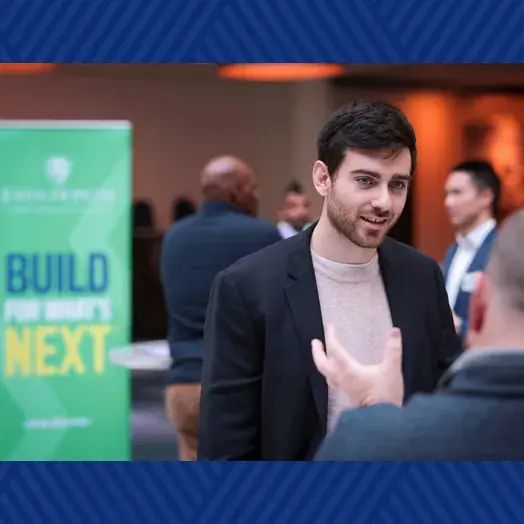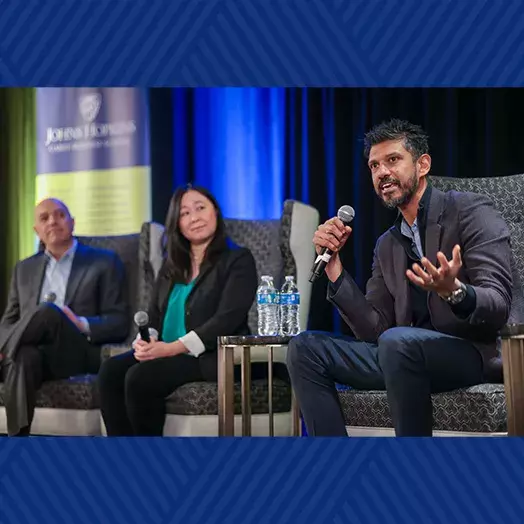
Investing in the future: Alum emphasizes equitable investments at venture capital firm
Mike Leffer (MBA ‘19) never set out to become a venture capitalist.
The first time he heard of venture capital was on the ABC TV show Shark Tank. But as he neared graduating from Johns Hopkins Carey Business School, a colleague invited him to start a venture capital firm from the ground up. And Leffer jumped.
First attending West Point and then serving in the Army, Leffer says his military service laid the foundation for a mission-driven career.
“When you spend years in the service, your work ethic and discipline are really honed. Your engine and motor operate at a really high level. In the military, you have a lot of trust and shared values with your colleagues because you’re all bought in on the mission of service,” Leffer said. “When looking for a career after Carey, I wanted to find that same alignment in terms of values and belief in mission.”
Building businesses and betting on the underdog
Leffer found that first at Squadra, a Baltimore-based venture capital firm that he helped build. With Leffer’s help, Squadra grew from two to 10 employees. He raised money, oversaw four major investments, and laid the groundwork for the firm to continue growing.
“Coming out of Carey, I wasn’t joining an established company. I was joining with another gentleman and starting a venture fund from scratch. It was a big leap being entrepreneurial and innovative,” Leffer said.
He leaped again in early 2021, joining Early Light Ventures, another Baltimore-based venture capital firm. For Leffer, joining Early Light Ventures was an opportunity to bring funding to innovators and entrepreneurs looking for someone to take a chance on them.
Leffer sees between 100 and 150 pitch decks each month, talks to five to 10 founders per week, and makes five or six investments each year. That’s about one investment for every 300 companies he reviews. But his diligence pays off, and others are taking note of his success. Leffer was named this year to the Baltimore Business Journal’s “40 under 40,” an annual honor recognizing the contributions of young local professionals.
“We get passionate about backing first-time entrepreneurs and underdogs,” Leffer said. “Most firms are chasing founders who have created and sold multiple companies successfully. Maybe our entrepreneurs don’t have the Johns Hopkins or Harvard MBA. They aren’t getting as much attention because they don’t have that background, but they are just as promising. We are looking for people with a chip on their shoulder and who have the hustle to build a great company.”
Good businesses that do good for the world
Leffer is focused on investments that check two boxes: They must be strong businesses with potential for growth and are positively impacting their community. Many of his projects are in the health care space, including Dynamicare Health, a platform supporting those with substance abuse disorders. Others, like Scanifly, a drone company that helps install solar panels, are environmentally friendly.
“Mission-driven work fulfills me. I wake up every day, and it doesn’t feel like work,” Leffer said. “I had a purpose in the army, and now I have found a purpose that feels very similar in venture capital.”
Leffer’s military background also gives him insight into some of the project pitches. He invested in Instant Teams, a training and staffing company that teaches military spouses how to work as customer support specialists and virtual sales representatives. The platform then connects trained spouses with Fortune 500 companies. With Leffer’s help, the company grew seven-fold in the first year, but he credits the founders, two military spouses.
“They will both run through walls to get the job done,” Leffer said.
What to Read Next

career outcomes
Alum leans into identity and advances at SalesforceEquity in investing
The same enthusiasm that Leffer looks for in founders, he brings to his own mission: helping to solve for inequity in the technology sector. He holds regular open office hours for underrepresented founders looking for an opportunity to pitch.
“Solving for the inequity in technology – whether it’s gender, race, or sexual orientation, is hugely important first and foremost because it’s the right thing to do,” he said. “As a venture capitalist, because I want to invest in the best startups, I would be letting my limited partners down if I don’t advocate for diversity. Research by Harvard, McKinsey, and other institutions shows that diverse companies consistently outperform and are more profitable than their peers.”
“And then, on a utilitarian level, we are losing out on so much innovation because our workforce is so homogenous and we are continuously recruiting from the same pools. We are ignoring talent that is underestimated. And as a society, we are losing out on that,” Leffer said. “Humanity has so much more to gain if we give everyone an equitable opportunity.”
Leffer also shares his expertise about entrepreneurship with anyone who wants to tune in to his podcast, “Extreme Uncertainty.”
“My favorite part is talking to entrepreneurs and hearing their stories about what they’re building and why,” Leffer said. “There are so many entrepreneurs who built and [made initial public offerings for] companies outside of the traditional tech hubs, Silicon Valley and New York. I want to share some of these stories and lessons learned and pass on the knowledge to the next generation of entrepreneurs.”


